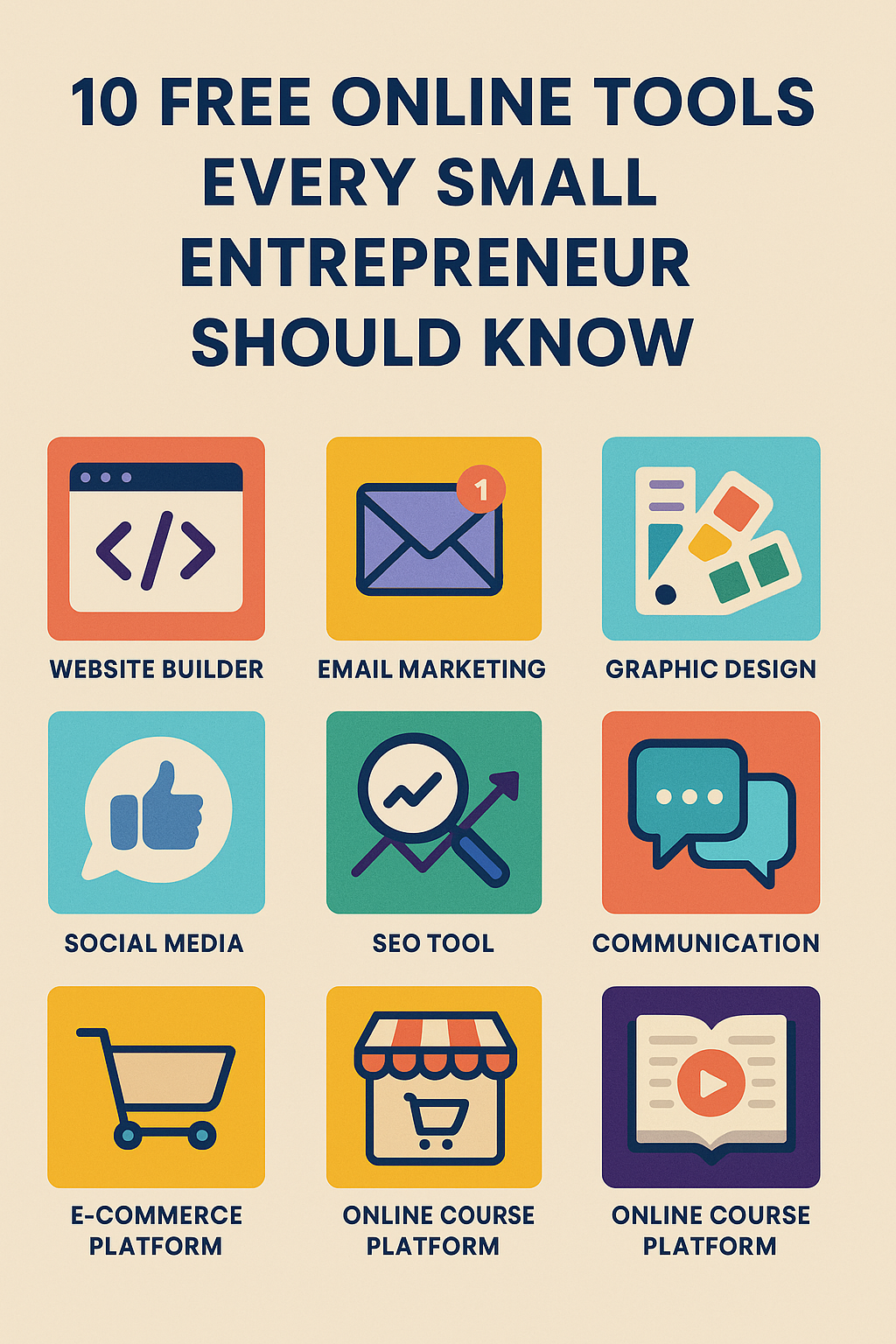Starting and running a business on a limited budget can be tough, especially for small entrepreneurs. The good news is that there are plenty of free tools online that can save time, boost productivity, and help you manage different parts of your business without breaking the bank.
In this article, we’ll look at 10 powerful free tools every small entrepreneur should know and use.
1. Google Workspace (Free Version)
Google’s free tools—Docs, Sheets, Slides, and Drive—are essential for collaboration and organization.
- Docs: For writing business plans and documents.
- Sheets: For financial tracking and data management.
- Drive: For storing and sharing files securely.
- Gmail: Professional email communication.
They’re cloud-based, so you can access them anywhere.
2. Canva
Canva is a free design tool that allows you to create professional graphics without design experience.
Use it for:
- Social media posts.
- Business cards and flyers.
- Presentations and pitch decks.
- Website or blog graphics.
Its drag-and-drop interface makes design quick and easy.
3. Trello
Trello helps small entrepreneurs manage tasks and projects using boards, lists, and cards.
Best for:
- Organizing to-do lists.
- Managing client projects.
- Tracking progress visually.
- Collaborating with freelancers or small teams.
It keeps everything clear and organized in one place.
4. Mailchimp (Free Plan)
Email marketing is crucial, and Mailchimp’s free plan lets you send emails to up to 500 subscribers.
Use it to:
- Build and manage an email list.
- Send newsletters and promotions.
- Automate welcome emails.
- Track performance with analytics.
Email marketing remains one of the highest ROI strategies for small businesses.
5. Wave Accounting
Wave offers free accounting software designed for small entrepreneurs.
Features include:
- Income and expense tracking.
- Invoicing clients.
- Receipt scanning.
- Financial reports.
It helps you manage money without hiring an accountant right away.
6. Buffer (Free Plan)
Managing multiple social media accounts is time-consuming. Buffer allows you to schedule posts across different platforms.
Benefits:
- Plan content in advance.
- Post consistently without logging in daily.
- Track engagement and performance.
Perfect for small entrepreneurs juggling social media with other tasks.
7. Zoom (Free Version)
Video meetings are now part of business life, and Zoom makes it easy.
Free features include:
- One-on-one meetings without time limits.
- Group meetings up to 40 minutes.
- Screen sharing for presentations.
- Recording options for later use.
Great for client calls, team check-ins, or online workshops.
8. HubSpot CRM (Free Plan)
Managing customer relationships is key to growth. HubSpot’s free CRM helps organize and track interactions with clients.
Features:
- Contact and lead management.
- Email tracking.
- Sales pipeline overview.
- Meeting scheduling.
It gives small entrepreneurs big-business tools for free.
9. Grammarly
Grammarly helps polish your writing for professionalism and clarity.
Use it for:
- Emails.
- Blog posts.
- Social media captions.
- Website copy.
It checks grammar, spelling, and tone, ensuring your communication looks professional.
10. Google Analytics
Every entrepreneur with a website should use Google Analytics.
Benefits:
- Track website visitors.
- Understand customer behavior.
- See which marketing channels drive traffic.
- Improve website performance.
It’s an essential tool for making data-driven decisions.
Final Thoughts: Free Tools, Big Value
Being a small entrepreneur doesn’t mean you need expensive software. With tools like Google Workspace, Canva, Trello, Mailchimp, and others, you can manage operations, marketing, and finances effectively—without extra costs.
The key is not to use every tool at once, but to choose the ones that best fit your current stage of business. As you grow, you can always upgrade to paid versions.
Start small, stay efficient, and let these tools give you the support you need to focus on what matters most: growing your business.
